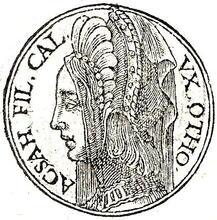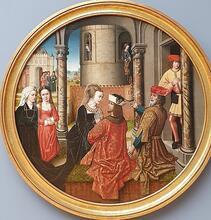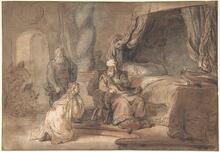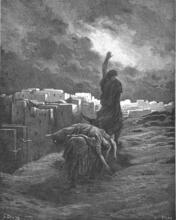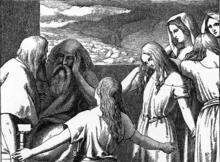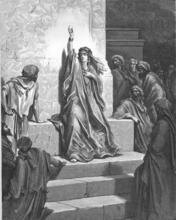Shua's daughter: Midrash and Aggadah
The Rabbis do not give significant attention to Shua’s daughter, who is the wife of Judah; the midrash generally views their marriage as a step down for Judah. However, the narratives of their children are analyzed in the midrashim, and the Rabbis give special meaning to the names and birthplaces of the children.
Marriage to Judah
The Torah she-bi-khetav: Lit. "the written Torah." The Bible; the Pentateuch; Tanakh (the Pentateuch, Prophets and Hagiographia)Torah relates that Judah went to a man named Hirah in the city of Adullam, where he married Shua’s daughter, who was “the daughter of a certain Canaanite” (Gen. 38:2). The Rabbis explain that “a certain Canaanite [literally, a Canaanite man]” teaches that Shua was from the area, where he was the light of the peoples’ eyes [i.e., very prominent]. One tradition identifies the Adullamite Hirah with Hiram, who lived in the time of David and of whom it is said: “for Hiram had always been a friend of David” (I Kings 5:15). Already in Judah’s time, this man “had learned to love this tribe”; but some Rabbis reject this proposed identification (Gen. Rabbah 85:4).
The Rabbis viewed Judah’s marriage to the daughter of Shua as a decline, which Gen. 38:1 records: “Judah left [va-yered, literally, went down from] his brothers.” With this marriage, Judah betrayed the way of his forefathers, as is portrayed in Mal. 2:11: “Judah has broken faith: abhorrent things have been done in Israel and in Jerusalem. For Judah has profaned what is holy to the Lord—what He desires—and espoused daughters of alien gods.” He married the daughter of an idolater, and thereby betrayed the way of Israel (= Jacob), who had been careful not to marry the daughters of the land (Tanhuma [ed. Buber], Vayeshev 9).
Another exegetical approach, however, argues that Judah did not sin when he married Shua’s daughter. The Rabbis ask: is it possible that Abraham enjoined Isaac not to take a wife from the daughters of the land, Isaac similarly enjoined Jacob, and Judah would then come and take a wife from among the women of Canaan? Rather, Shua was not a Canaanite; she was “the daughter of a certain Canaanite,” (Gen. 38:2) and “Canaanite” was merely an appellation for a merchant. As Isa. 23:8 states: “whose merchants were noble, whose traders [kinanehah] the world honored” (BT Pesahim 50a).
Children of Shua’s Daughter and Judah
The Rabbis imparted special meaning to the names or birthplaces of the three sons who were born to Judah and Shua’s daughter, Er, Onan, and Shelah: Er was emptied (hu’erah) from the world; Onan caused mourning (aninah) for himself (i.e., death); and Shua’s daughter gave birth to Shelah in Chezib (keziv, one meaning of which is “cease”), which she so named because she ceased bearing children there (Gen. Rabbah 85:4).
The firstborn of Shua’s daughter married Tamar and died; then her second son Onan married Tamar and he, too, expired. The midrashim present the death of both as punishment for their engaging in unnatural intercourse with her. Er did this so that Tamar would not become pregnant, for he feared that her beauty would diminish as a result; and Onan did so, because he knew that “the seed would not count as his” (Gen. 38:9) (BT Yevamot 34a).
In another tradition, Judah is punished in this way because he deceived Jacob when he informed him that Joseph was dead. God told Judah: “You have no children, so you do not know the grief at their loss. You deceived your father and told him that his son had died—by your life, you shall take a wife and bury your children, so that you will know the sorrow that comes from the loss of sons” (Tanhuma, Vayigash 10).
Yet another tradition views the death of the sons and of Shua’s daughter as punishment for Judah’s initiating something but not completing it. Judah persuaded his brothers not to kill Joseph, but rather sell him to the Ishmaelites (Gen. 37:26–27), but he did not finish his task, since he could have completely rescued his brother. He should have brought Joseph to their father, carrying him on his back. He therefore was punished by having to bury his wife and his two sons; he also came down in the world, as it is said (Gen. 38:1): “Judah left [va-yered, literally, went down from] his brothers” (BT Suspected adulteressSotah 13b; Gen. Rabbah 85:3).

